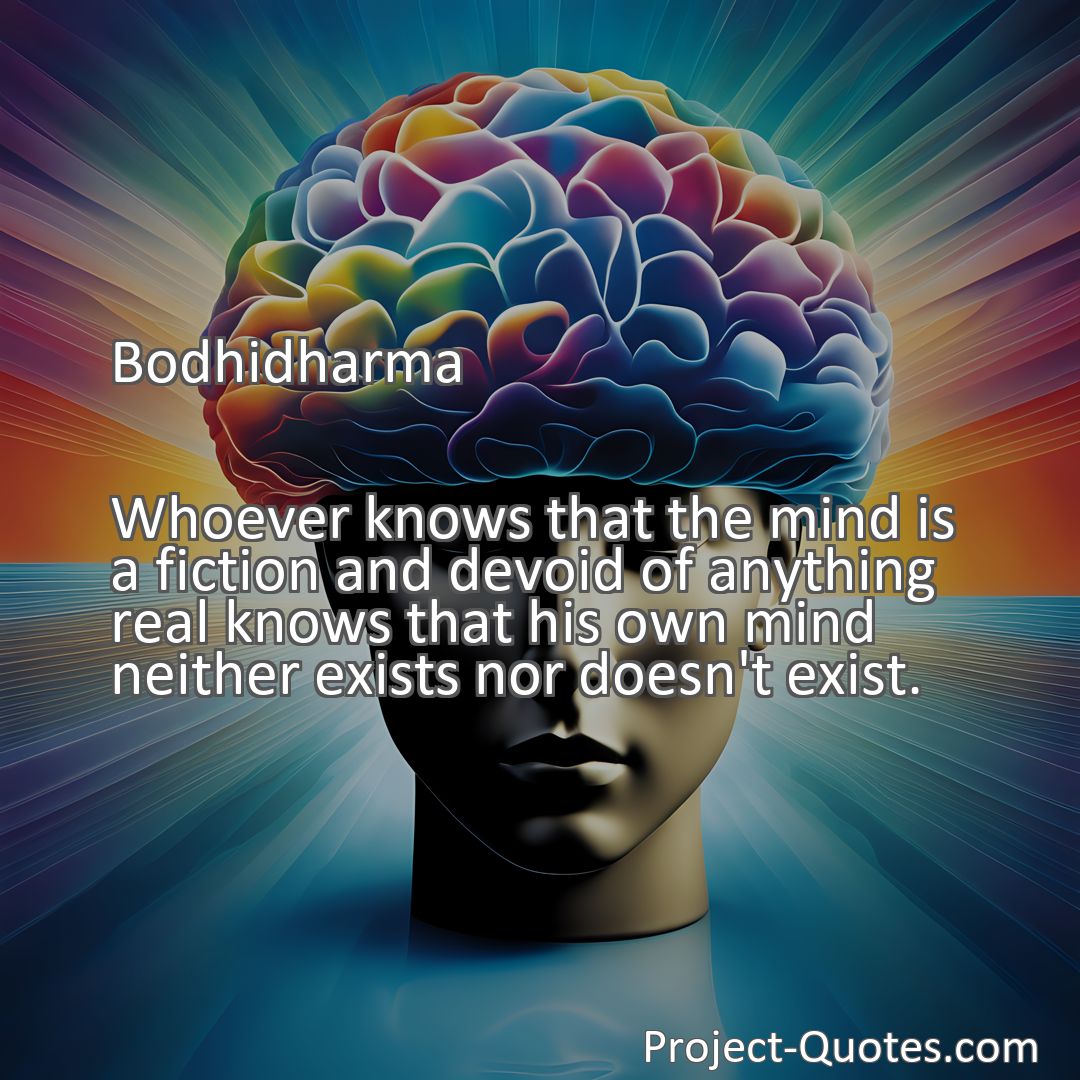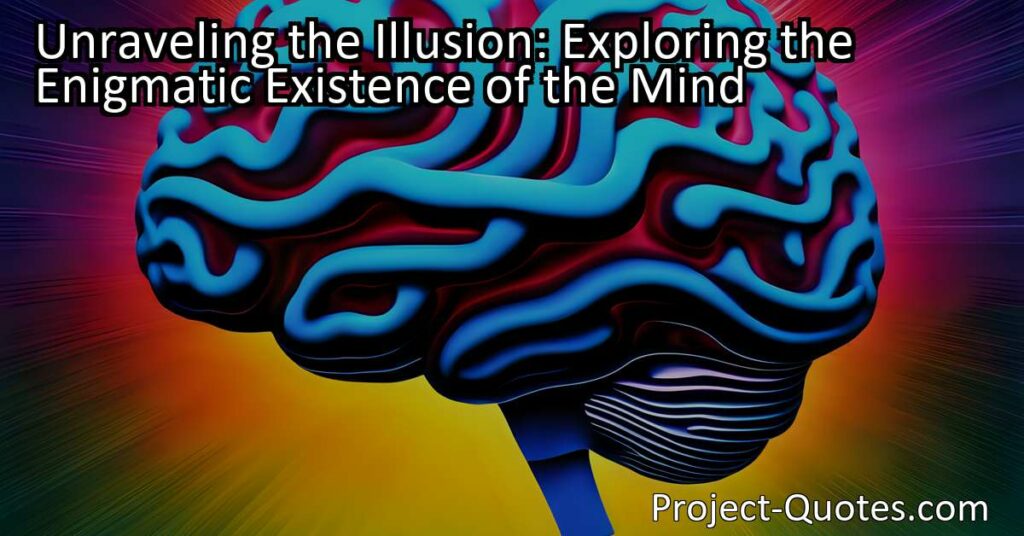Whoever knows that the mind is a fiction and devoid of anything real knows that his own mind neither exists nor doesn’t exist.
Bodhidharma
Unraveling the Illusion: Exploring the Enigmatic Existence of the Mind takes us on a captivating journey to question the reality of our own minds. Through the wisdom of Bodhidharma, we learn that the mind is like clouds drifting across the sky, constantly changing and devoid of anything real. By understanding this paradox, we can free ourselves from attachment and discover a sense of freedom and peace.
Table of Contents
- 1 Whoever knows that the mind is a fiction and devoid of anything real knows that his own mind neither exists nor doesn’t exist.
- 2 Bodhidharma
- 3 Meaning of Quote – Whoever knows that the mind is a fiction and devoid of anything real knows that his own mind neither exists nor doesn’t exist.
- 4 Freely Shareable Quote Image
- 5 Related
Meaning of Quote – Whoever knows that the mind is a fiction and devoid of anything real knows that his own mind neither exists nor doesn’t exist.
Have you ever taken a moment to ponder the true nature of your mind? What if I told you that your mind is nothing more than a figment of your imagination, a mere fiction that holds no concrete substance? This intriguing concept is aptly captured by the quote from Bodhidharma, the ancient Buddhist monk. According to him, those who recognize that the mind is devoid of anything real will also come to realize that their own mind neither exists nor doesn’t exist.
So, let’s embark on a journey of exploration and delve into the depths of the mind. Buckle up, as we unravel the mysteries of the mind and its elusive existence!
Imagine your mind as a blank canvas, awaiting the strokes of something tangible and meaningful. Many of us tend to believe that our mind is real and solid, a fundamental part of who we are. However, what if I told you that it is all an illusion? What if I told you that your mind is a creation of your own imagination, a compilation of thoughts, emotions, and experiences?
The mind is indeed a complex phenomenon that defines our perceptions, thoughts, and actions. It is the prodigious wellspring of human creativity, the catalyst for scientific advancements, and the driving force behind our emotions. However, despite its profound influence on our lives, the mind’s existence remains enigmatic. Is it a tangible entity, a physical organ within our brain, or is it something more ethereal and intangible?
Bodhidharma challenges us to question the very foundation of our understanding. He invites us to explore the possibility that the mind, as we perceive it, is merely a construct, an illusion that lacks a concrete reality. This notion might seem bewildering at first, but let’s dive deeper into his philosophy to understand the reasoning behind his statement.
According to Bodhidharma, recognizing the fictitious nature of the mind leads us to a profound realization. If the mind is inherently unreal, it cannot be said to either exist or not exist. It transcends the boundaries of conventional dualistic thinking. It is neither a tangible object nor an intangible entity. Instead, it exists in a realm beyond such dichotomous categorizations.
The essence of Bodhidharma’s teaching lies in challenging our perceptions and understanding of reality. He implores us to question the nature of our own mind and the limitations we impose upon it. By recognizing the illusory nature of the mind, we free ourselves from the constraints of attachment and self-identification. We liberate ourselves from the incessant chatter of our thoughts, emotions, and desires, allowing us to experience a sense of freedom and transcendent peace.
Now, you might be wondering, how can we grasp the concept of a non-existent mind? How can we reconcile this paradoxical notion with our everyday experiences? To begin unraveling this mystery, let’s delve into the realm of meditation.
Meditation has long been a practice employed by Buddhist monks and practitioners around the world to transcend the limitations of the mind. Through focused attention and mindfulness, meditation allows us to observe our thoughts without judgment or attachment. It enables us to witness the fleeting nature of the mind, recognizing its transient and insubstantial nature.
During meditation, we gradually come to realize that our thoughts arise and pass away, much like clouds drifting across the sky. We learn to detach ourselves from the content of our thoughts and recognize that they are not an inherent part of our being. Instead, they are ever-changing mental formations that arise from various causes and conditions.
As we cultivate this awareness, we begin to peel back the layers of illusion that shroud the true nature of our mind. We come to understand that our thoughts do not define us, nor do they possess any inherent existence. They are merely transient phenomena that arise and dissolve within the spaciousness of our consciousness.
By cultivating this awareness, we start to loosen the grip of our ego, the illusionary self that thrives on attachment and identification. We recognize that the mind, as a construct, is not an essential part of our being. It is merely a tool for navigating the world, a repository of conditioned patterns and learned behaviors.
Through this understanding, we can embrace the paradoxical nature of Bodhidharma’s statement. Even though the mind is a fiction and devoid of anything real, it still holds a significant influence over our daily lives. The thoughts and emotions that arise within our mind shape our perceptions, reactions, and ultimately, our experiences.
However, by recognizing the illusory nature of the mind, we gain a newfound sense of freedom and agency. We no longer cling to our thoughts and emotions, allowing them to dictate our reality. Instead, we become active participants in our own lives, consciously choosing how we respond to the ever-changing flow of thoughts and experiences.
In the absence of attachment to the mind, we can attain a state of profound peace and equanimity. We realize that true happiness and contentment lie not in the external world but within the depths of our own consciousness. By disentangling ourselves from the illusions of the mind, we open ourselves to the boundless potential of the present moment.
Now, as we conclude this exploration of Bodhidharma’s profound insight, let’s take a moment to reflect on our own understanding of the mind. What have we learned from his teachings? Are we willing to embrace the notion that our mind is but a fiction, devoid of anything real?
In the ever-unfolding journey of self-discovery, it is essential to challenge our preconceived notions and beliefs. By questioning the nature of our own mind, we open ourselves to new perspectives and possibilities. We expand our consciousness and invite a deeper understanding of our true nature.
So, dear reader, I leave you with this timeless wisdom from Bodhidharma: Whoever knows that the mind is a fiction and devoid of anything real knows that his own mind neither exists nor doesn’t exist. Embrace the paradox, embark on the path of self-inquiry, and may you discover the profound truth that lies beyond the illusory veil of the mind.
I hope this quote inspired image brings you hope and peace. Share it with someone who needs it today!


